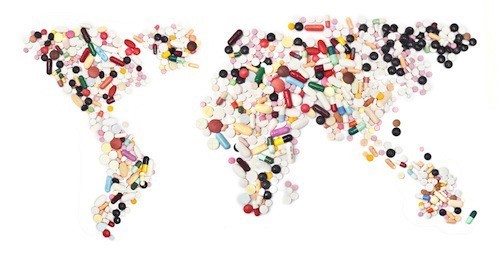Corona Virus: The Most Serious Crisis Facing Global Trade
Is the world economy close to entering a recession, and is a repetition of the Great Depression scenario that occurred in 1929 imminent? What are the implications of the spread of the Corona virus on global trade? Many questions arise for decision makers, policy makers, research centers and economists after the virus paralyzes the second largest economy in the world.
The world breathed a few days before the beginning of the armistice truce of the US-Chinese trade war, and agreed to implement the first stage of the trade agreement between the two countries, but suddenly it woke up to a new type of war that seemed more dangerous to global growth than its predecessors, which is a “virus” war.
The importance of China lies in being 17% of global GDP, and it comes after the United States in economic strength and its population constitutes 20% and more of the world’s population, and is considered the largest source of goods in the world, as it is also the largest oil importer, and it has a major impact in the movement of heads International money and investment, one of its main engines and striking force is the industry, which in recent years has turned into a factory for the world, and its products invade every home. The Chinese miracle has succeeded in transforming the country’s economy from fragile rentals under a totalitarian system to a successful capitalist economy during less than 40 Years, today’s China companies are brawling groups The US intercontinental and control without exaggeration in the world’s food and clothing and devices used by the beginning of the game to cheap electrical appliances and automotive devices and mobile phone and communications technologies of the fifth generation.
Corona’s Repercussions On Global Markets
The heat of the Corona virus is beginning to appear on the movement of trade and supply chains in the world, asset prices, and consumption in China and the world, which has threatened to decline global output growth this year, and expectations suggest that Chinese growth will decline from 6% currently to below 4% in the first quarter of the year Ongoing 2020.
A bleak picture, and a pessimistic view of the future of the world economy during 2020 … The spark of the crisis will erupt in China, which is considered a difficult number in the global output. What are the likely scenarios of what is happening and the most prominent sectors affected by the new virus war.
The effects of the virus were directly reflected on the stock markets, commodity and mineral trade, travel and global tourism. Chinese stocks lost about $ 700 billion of their value after a long vacation that lasted with many factories closing their doors, isolating cities and imposing travel restrictions, which fueled concerns about global supply chains.
Although the Chinese authorities took precautionary measures to seek to reassure investors, including pumping $ 173 billion in the financial system and reducing interest, in an effort to help companies, banks and individuals, who were affected by the outbreak of the new Corona virus, the positive effects of this move did not appear directly on the markets that were quick to register Sharp declines, and it seems we will see new chapters of the repercussions of the crisis, pending the discovery of a vaccine that can control the virus.
The repercussions of the virus crisis have spread to global factories and companies, as a large number of global car manufacturers, including Hyundai, Tesla, Ford, PSA Peugeot Citroen, Nissan, and Honda Motor, have announced the suspension of work in some of their factories in China as a result of the epidemic. In China as well as Airbus aircraft manufacturing that halted the final assembly line of its aircraft in Tianjin.
The German company, Adidas, for the manufacture of clothes and sports equipment, also announced that it would temporarily close a “large” number of its warehouses in China. More than 30 airlines have suspended flights to China, which means that the isolation and economic impacts of the disease are on the rise.
The performance of primary commodity markets was not better, especially coffee, which fell by nearly 22% from its highest levels recorded in future contracts for coffee on the London Commodity Exchange, given that China is one of the major coffee importers in the world, and this sharp decline came after the closure of the global “Starbucks” chain More than half of its 4,300 branches in China
Copper, silver, palladium and iron ore fell, as gold continued to trickle out of swarm, rising as a safe haven in global crises.
Despite optimistic reports of an imminent end to the virus at the end of the first quarter of this year, estimates indicate that the global economy will incur losses of $ 160 billion this year as a result of Corona, and this figure is expected to escalate if the spread of the virus is prolonged without eliminating it.
Losers and winners:
Ambiguity prevails over what the Corona crisis will lead to, and it seems US President Donald Trump, who emerged victorious a few days ago by forcing China to sign a trade agreement is in a critical position today, because the boom of US exports to China does not seem imminent as expected, which prompted Larry Kudlow, economic advisor To the White House to hasten to confirm that the virus will delay the expected prosperity of US exports to China as a result of the first stage of the trade agreement between the two countries.
European Central Bank President Christine Lagarde seemed more realistic to put forward when she said the virus was exacerbating economic uncertainty. “While the threat of a trade war between the United States and China has diminished, the Corona virus adds a new layer of uncertainty,” she said.
European countries, led by Germany, the third largest world economy, will also be affected by the current situation. The decline in Chinese demand will lead to a disruption in the movement of its exports, and therefore the European output is expected to decrease as a result of the Chinese crisis. The same is true for other countries of the world that have close export relations with China, and therefore there are no winners from the virus crisis except the pharmaceutical sectors in the world and the monopolists of its industry, while the sectors of tourism, transportation and logistics are facing real crises.
Perhaps the great disruption in the US-China trade agreement presents an opportunity for emerging countries, especially the Latin American countries, because the trade agreement signed in January was providing goods movement of up to 200 billion dollars, and this can be said that hopes to maintain export rates for the US market are recovering Today with the Corona virus disaster, especially Brazilian or Argentine soy exporters.
Other countries will enter the list of those affected by the virus, especially the major exporters in the steel market, as China today represents about 50 percent of the global demand for steel, and exporting countries such as Russia, South Korea or even Turkey could be affected if prices continue to decline and weak demand.
For the Arab region, China is the largest oil importer in the world after the transformations witnessed by the American market as a result of the expansion of shale oil production, so any change in China’s oil consumption will have a major impact on the global energy market. An economic report showed that Chinese demand for oil decreased by 20%, as the disruption of supply chains prompted the largest oil refining company in China to reduce production by about 12% during the month of February. In practice, this means that the oil exports of the Arab region, which is considered the most important strategic commodity, will be greatly affected if the disease continues to spread, making it difficult for the Arab producing countries to avoid the effects of a deep recession that could sweep the world.
After the drop in oil prices in the beginning of February, approximately 18% of its peak recorded in January, the technical committee of the Organization of Petroleum Exporting Countries (OPEC) whose Arabs are the main members of a meeting in Vienna to study the effects of the virus outbreak on demand, hastened to recommend the committee meeting to the next ministerial meeting The organization has an additional production cut of 600,000 barrels per day, to be added to the previous cuts, which means restricting global oil supplies in the next stage with declining demand as a result of corona and stockpiles in importing countries
Regardless of the fact that the Arab and Gulf countries are producing and exporting oil, they will be affected by the emerging virus as a result of the global emergency resulting from the paralysis that affected the Chinese economy.
And the effects caused by the Chinese virus will cast a shadow on the gas exporters in the world as well, as the prices of natural gas futures contracted in the American dealings, as Bloomberg News indicated the decline in gas prices after the spread of the Corona virus in China, which disrupted the global trade movement, which threatens US exports of liquefied natural gas are upset as prices for immediate fuel contracts in Europe and Asia drop.
Tom Sall, senior vice president of energy trade at INTLFC Stone Financial, said that if China canceled any LNG shipments from its imports due to the virus, this would have a major impact on prices in the US market, noting That, although China has not imported any LNG directly from the United States about a year ago, due to the trade war between the two sides, the cancellation of any shipments will affect prices in the global market and thus the profits of American exporters.
A blow To The Bond Market:
The Chinese virus crisis will also overshadow the global bond market and affect the ability of governments to borrow, as fund managers expect bond issues in hard currency to decline. They believe that the impact of the spread of the Corona virus in China on global economic growth may be reflected in the increase in financing costs for debt issuers, especially in the Middle East, which could curb borrowing.
Chinese financiers are currently the largest player in the debt market alongside the United States, with China wanting to play a greater political role in geographical areas that were for years exclusive to America, as Chinese and Asian investors are today the largest buyers of debt bonds issued by the world’s governments to cover deficits in their budgets.
Conclusion:
Signs of improvement in the performance of the global economy this year seem a distant dream in light of the trade war between the United States and its trading partners, especially in the first quarter of this year, and the Chinese virus crisis has exacerbated factors that negatively affect global growth. Despite the expectations of discovering a vaccine for the disease, it is expected that Chinese growth will record a decline of up to 2%, and this will inevitably be reflected in the global growth, which is threatened with a decrease of half a percentage point due to the current repercussions of Corona.
With factories shutting about 69 percent of China’s manufacturing capacity, it appears that the global industrial sector is entering a severe recession. It should be noted that the uncertainty and uncertainty surrounding the global economy is a large part of it myself as a result of the spread of the disease, but the uncertainty is mainly related to the trade war launched by the United States with its trading partners.
In light of these developments, world trade is expected to face the most serious crisis in its history, and it may lead to the world sliding into a period of great depression that has hit the world economy for years.
The year 2020 is considered a hinge for the global economy to get out of the bottleneck or enter into a depression .. The irony here is that the United States that was the cause of the global recession in 1929 and its effects extended until the end of World War II is the same that ignites its crises with China and its trading partners a spark of a new recession has It leads to wars and alliances leading to a new world and economic order.
Resources:








